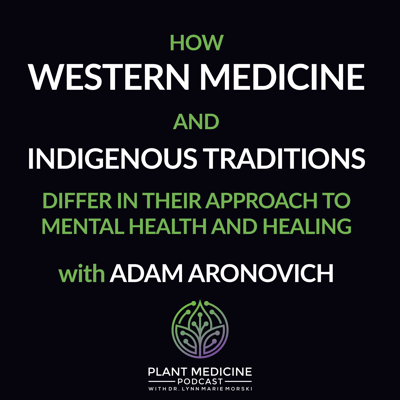How Western Medicine and Indigenous Traditions Differ in their Approach to Mental Health and Healing with Adam Aronovich
- 76
- 10/01/2020

Summary
Adam Aronovich is a doctoral candidate at the Universitat Rovira i Virgili in Spain, focusing on Medical Anthropology and Cultural Psychiatry. He is an active member of the Medical Anthropology Research Center (MARC) and part of the Ayahuasca Community Committee at the Chacruna Institute for Psychedelic Plant Medicines. In the last four years he has conducted extensive fieldwork in the Peruvian Amazon, where he has been doing qualitative research in collaboration with ICEERS, the Beckley Foundation, and, more recently, the Centre for Psychedelic Studies at Imperial College. Beyond his work conducting and coordinating research, Adam regularly facilitates workshops at the Temple of the Way of Light, a prestigious healing center in the Iquitos area.
In this episode of the Plant Medicine Podcast, Adam discusses a host of issues surrounding modern western paradigms of psychiatry and mental health and contrasts these with approaches taken by traditional cultures, such as those of the Shipibo people of South America.
Adam has spent years studying traditional societies as an anthropologist and his research specifically focuses on the different approaches to medicine in various cultures, and how people in different cultural milieus experience health and illness differently.
Through his work, Adam hopes to contribute to the field of medicine by translating the medical understandings of traditional cultures into terminologies and categories digestible by the Western medical establishment.
In this conversation, Adam explains how the contemporary approach to mental health in the West is colored by a fixation on medicalizing peoples’ experiences into diagnostic categories and by a tendency to view health and illness exclusively on the level of the individual. In contrast to this approach, Adam draws on his ongoing research with the Shipibo people, showing how their approach to healing in ayahuasca ceremonies is much more communal and relational in nature.
In this episode of the Plant Medicine Podcast, Adam discusses a host of issues surrounding modern western paradigms of psychiatry and mental health and contrasts these with approaches taken by traditional cultures, such as those of the Shipibo people of South America.
Adam has spent years studying traditional societies as an anthropologist and his research specifically focuses on the different approaches to medicine in various cultures, and how people in different cultural milieus experience health and illness differently.
Through his work, Adam hopes to contribute to the field of medicine by translating the medical understandings of traditional cultures into terminologies and categories digestible by the Western medical establishment.
In this conversation, Adam explains how the contemporary approach to mental health in the West is colored by a fixation on medicalizing peoples’ experiences into diagnostic categories and by a tendency to view health and illness exclusively on the level of the individual. In contrast to this approach, Adam draws on his ongoing research with the Shipibo people, showing how their approach to healing in ayahuasca ceremonies is much more communal and relational in nature.
In This Episode
• How traditional cultures conceptualize mental suffering
• The limits of Western psychiatry when crossing cultural boundaries
• How the animist perspective of Shipibo healers informs their approach to healing
• Dangers of over-emphasizing the medicalization of psychedelics
• The relational, rather than an individualistic focus of ayahuasca ceremonies
• Confronting our individual and collective shadows
Quotes
“Every medical system or every medical approach is inseparable from the culture, the cosmology, the metaphysics that underlie the understanding of that culture.” [32:32]
“The way the Shipibo medical system works… is that the healing doesn’t necessarily only happen through the agency of the human healer, but the human healer works as a channeler of medical agency of different sources, of different spirits in the environment.” [36:34]
“The most important benefits or the most important values that these substances have are not necessarily therapeutic in the sense of medical, or clinical, or psychological… but are actually much deeper than that and they’re epistemic, they’re ontological, they’re relational.” [52:25]
“Ayahuasca oftentimes will get us to a place where we can actually experience that reconnection with the wider community of sentience that makes the ecosystem of our world.” [1:02:29]
“The way the Shipibo medical system works… is that the healing doesn’t necessarily only happen through the agency of the human healer, but the human healer works as a channeler of medical agency of different sources, of different spirits in the environment.” [36:34]
“The most important benefits or the most important values that these substances have are not necessarily therapeutic in the sense of medical, or clinical, or psychological… but are actually much deeper than that and they’re epistemic, they’re ontological, they’re relational.” [52:25]
“Ayahuasca oftentimes will get us to a place where we can actually experience that reconnection with the wider community of sentience that makes the ecosystem of our world.” [1:02:29]
Links
* The Psychedelic Medicine Podcast has allowed the Psychedelic Medicine Association to post episodes as an educational resource, and in return the PMA is hosting the podcast show notes.


